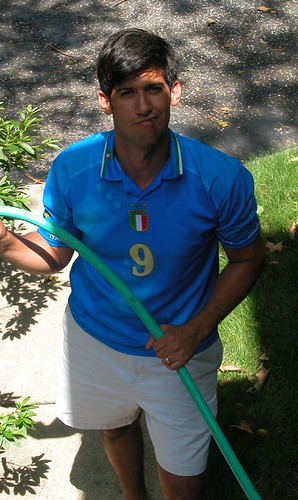
Photo: Our front yard used to be covered in ivy, we dug it up and seeded a lawn.
Many homeowners are intimated with the prospect of taking care of their own lawn. They fear cutting, fertilizing, and watering their lawn and year after year are disappointed with the way their lawn looks. In turn, many homeowners hire a landscaper with no formal training and who charges an arm and a leg to take care of what most people see first when they come to your home (would you let anyone pick your clothes and dress you?).
So, I’m here to tell you to fire your landscaper (that’s right call him tonight) and read the following 6 lawn maintenance tips. If your lawn doesn’t looks great after a year, I’ll come over and give you a lawn care tutorial (provided you don’t live in sub Saharan Africa).
1. Keep your grass tall or mow high. You know how your local golf course keeps their lawn (kind of like a green crew cut), well that will kill your lawn at home. Keeping your lawn between 2-3 inches will allow it to retain moisture, fend off disease/blight, and give the appearance of a lush and healthy lawn. Get to know the height settings of your lawn mower and use those setting to control grass height (especially during the late summer months).
2. Test your soil. Contact your local cooperative extension at your local college or university and they’ll mail you a soil testing kit. A soil test will tell you how to fertilize come the Spring and Fall. Don’t just run to the local Home Depot and guess which number fertilizer you need, let a soil test tell you how to amend your soil (including lime).
3. Don’t water at night or in the afternoon. The best time to water your lawn is in the early morning, so that 1. your lawn has an opportunity to absorb the water and 2. it doesn’t develop any blight due to watering too late in the evening. If your lawn is large water in stages and let the water soak in for 30-45 minutes. You should only be watering once a week, even in extreme weather.
4. Don’t hire a landscaper. Taking care of your lawn, once you have the right equipment and know-how, is super easy and also provides an immediate pride of ownership type feeling that can motivate you to take on other projects at home. Plus, you’re saving money by cutting your own lawn and are getting exercise.
5. Detach and aerate your lawn in the Spring (once per year). If you don’t complete these two tasks you’ll have a compacted, hard, lawn surface that won’t allow for water and nutrients to get down into the soil (and detaching gets rid of any dead grass come the end of winter). I detach with a rake (it’s tough work), but I recommend renting an aerator from the local home center.
6. Get the right equipment. With any project, it’s difficult to do a job well unless you have the right equipment. In turn, make sure you purchase a quality mulching mower and sharpen the blade regularly (personally, I don’t mulch because it tend to suphicate my lawn, but other folks I know have had success with mulching). You’ll also need a quality rake, fertilizer spreader, edger, and lawn shears. I love power tools, but I don’t own a string trimmer and the 5 year old electric blower gets minimal use because I prefer sweeping/raking (given the exercise).
Finally, and this isn’t really a tip but rather a fact, grass will NOT grow where there is shade. And no matter how desperately you want grass you really do need lots of sunshine for a lawn to flourish. If you have areas where the sun only shines for 2-3 hours a day, you may want to consider other grand covers like ivy, pachysandra, etc.
Photo: You need to spend time on your lawn (no way around that), so you might as well enjoy it!



It’s interesting re the time to water. Some would argue that watering early in the day isn’t a good choice because the heat of the day will evaporate the water from the ground, so water in the evening. Also, watering in the day creates many thousands of mini-magnifying lenses (via the water droplets) which burn the plant with the droplets. Perhaps this is more true for flowers/vegetables than lawn, but that’s the view.
And thus ends the opposing philosophical view of when to water.
For myself, the older I’ve gotten, the more often I water even having to get up at least once during the night to do so.
Thanks for the comment. The reason why I don’t advocate watering a lawn at night (especially during the summer months) is that it doesn’t really cool of all that much and excess moisture *can* lead to mold and rot in dark conditions (it happened to our lawn).
If you water in the early AM (and not after 8AM) your lawn should have enough time to take in water without any major water loss (come the noon sun).
Vince
Landscaping Directory
Great Info! Thanks Landscapers Directory
How to Negotiate With Contractors Before and During a Home Improvement Project: 12 Tips
(Some home improvement projects are just too big for the average homeowner to take on him or herself. Case in point, when a 100+ year old Silver Maple falls across the entire width of your street.) Like many first…
Curious, what do you use to edge your lawn?